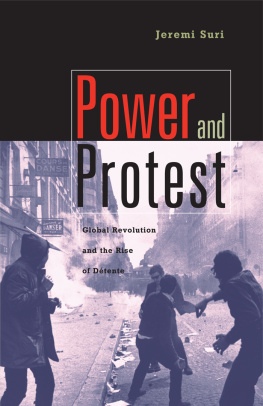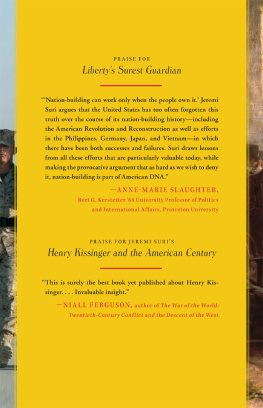POWER AND PROTEST
Copyright 2003 by the President and Fellows of Harvard College
All rights reserved
Printed in the United States of America
First Harvard University Press paperback edition, 2005
Library of Congress Cataloging-in-Publication Data
Suri, Jeremi.
Power and protest : global revolution and the rise of detente / Jeremi Suri.
p. cm.
Includes bibliographical references and index.
ISBN 0-674-01031-0 (cloth)
ISBN 0-674-01763-3 (pbk.)
1. Detente. 2. World politics19651975.
3. Student movementsHistory20th century.
4. United StatesSocial conditions19601980.
5. ChinaSocial conditions1949 6. Soviet UnionSocial conditions19451991.
7. EuropeSocial conditions20th century. 8. Protest movementsUnited States.
9. Protest movementsEurope. I. Title.
D849 .S83 2003
909.826dc21 2002038812
To Alison
ACKNOWLEDGMENTS
This book received support from many institutions. I wish to thank the University of Wisconsin Graduate School; the U.S. Institute of Peace; the Smith Richardson Foundation; the Center for International and Area Studies at Yale University; the Seeley G. Mudd Manuscript Library at Princeton University; and the Dwight D. Eisenhower, John F. Kennedy, Lyndon B. Johnson, and Gerald R. Ford Presidential Libraries for funding much of my research. Individuals at each of these institutions provided me with encouragement, expert assistance, and good cheer. I must also express my appreciation to the many archivists in Germany, France, Russia, Hungary, Great Britain, and the United States who facilitated my work. Without the skill of such professionals, historians could never make meaningful claims.
I must single out International Security Studies (ISS) at Yale and the Center for International Security and Cooperation (CISAC) at Stanford for allowing me to share in two extraordinary communities of learning. Both institutions sponsored a series of programs that enriched my intellectual vision, provided extensive resources for research and writing, and exposed me to exciting ideas and fascinating people.
The scholars and friends who have offered advice and encouragement are really too numerous to name, but I want to express special gratitude to two individualsJeremy Fielding and Jay Gellerwho shared lodgings and meals with me during extensive archival expeditions. Their companionship away from home made the long months of foreign research tolerable.
I have been blessed with extraordinary mentors throughout my academic career. While I was a Stanford undergraduate, David M. Kennedy, Barton Bernstein, and Jack Rakove taught me what it meant to be a historian. At Ohio University, Steven Miner and Chester Pach broadened my historical vision. At Yale, Paul Kennedy and Jonathan Spence guided me in conceptualizing, researching, and writing rigorous international history.
Most of all, I have benefited from the consistent support of John Lewis Gaddis. I have known John for more than ten years, and he has always provided a model of academic integrity. He encouraged me to see the value in a broad international study, but he also required me to strive for the very highest standards in accuracy, clarity, and elegance. John read some chapters in twelve successive drafts, demanding that I rewrite errant sentences and rethink unpersuasive arguments. Though possessing strong opinions of his own, John never tried to coerce me to his personal perspective. He held me to the same high standards to which he holds himself. I am profoundly grateful.
The final version of this book reflects the insightful and detailed suggestions of my editor, Kathleen McDermott. Her penciled comments on virtually every page of the manuscript showed me how to write a clearer and more engaging narrative. Her faith in my work has inspired me. My research assistant, Sean Gillen, helped me to follow through on Kathleens advice. Laura Gottlieb crafted an outstanding index.
I have also found inspiration in my new hometown of Madison and its great university. As one of the youngest members of the faculty, I have received encouragement from many wiser colleagues. Most important, I have drawn energy from a remarkable community of scholars who combine academic breadth, pedagogical passion, and community service. Yes, the Wisconsin Idea is alive and well. This is my first contribution.
I have dedicated this book to the most amazing person I know, my wife, Alison Alter. Her creativity and devotion inspired me to think broadly. Her commitment to make the world a better place drove me to ask important questions. Above all, Alisons love gave me the confidence to undertake this project, and also the inclination to finish it and move on to other things.
CONTENTS
1
THE STRAINS OF NUCLEAR DESTRUCTION
2
POLITICAL CONSTRAINTS AND PERSONAL CHARISMA
3
THE LANGUAGE OF DISSENT
4
THE ILLIBERAL CONSEQUENCES OF LIBERAL EMPIRE
5
THE GLOBAL DISRUPTION OF 1968
6
THE DIPLOMACY AND DOMESTIC POLITICS OF DETENTE
The 1960s were years of unrest: students demonstrated in streets across the United States and Western Europe, dissidents agitated for more freedom in the Soviet Union, andmost astonishing of allyoung Red Guards created chaos throughout China as part of a Cultural Revolution. Events in China were certainly unique, especially in that the chairman of the ruling Communist Party, Mao Zedong, manipulated the masses who attacked established authorities. No Western or Soviet leader served as an equivalent inspiration for protesting citizens.
China and the other great powers did, however, share one important similarity in their respective domestic upheavals. Leaders in each state had to accommodate themselves to a stalemated Cold War world that restricted policy flexibility. Protests during the 1960scontrolled from above in China, more independent in Europe and Americaattempted to escape the limits of the post-1945 long peace between the largest communist and capitalist states.
The mechanisms of dissent differed in each society, but internal unrest threatened the leadership in nearly every countryincluding China. In July 1967 Mao had to depart in haste from the industrial city of Wuhan, fearful that the domestic upheaval he had unleashed imperiled his personal security. Soon thereafter the chairman began to warn against extreme anarchism.
Like Mao less than a year earlier, in late May 1968 French President Charles de Gaulle whisked his wife away from turmoil in Paris. After an unplanned helicopter trip across the West German border, de Gaulle lamented the total paralysis of his government. Popular protests throughout France left the president confounded by the evidence that he was, by his own admission, not in charge of anything any more.
In West Germany, where de Gaulle had sought temporary haven, popular unrest in 1968 created similar difficulties for leaders. Foreign Minister Willy Brandtwho became chancellor a year laterdespaired that young people in many of our countries do not understand why we, the older ones, cannot cope with the problems of [our] age. Brandt called for a period of reason to control dangerous tensions within society.
Johnsons successor, Richard Nixon, labeled these conditions a war at home. He spoke in his inaugural address of a long night for the American spirit. During the wee hours of 9 May 1970 this long night produced a bizarre moment. Accompanied only by his valet, Nixon confronted a group of antiwar protesters encamped around the Lincoln Memorial. He attempted to convince the skeptical audience that he shared their ideals but could not avoid extremely unpopular policies. The presidents late-night efforts proved futile; protests continued across the nation.









